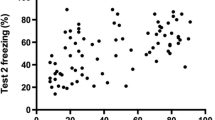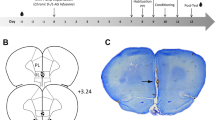Abstract
Rationale. The potentiation of the acoustic startle response (ASR) by stimuli associated with aversive events is mediated via the amygdala and is used as an index of "anxiety" and "fear". In laboratory animals, cholecystokininB (CCKB) agonists increase anxiety and fear and activation of amygdala CCKB receptors potentiates ASR. Additionally, antagonism of CCKB receptors attenuates fear-potentiated ASR.
Objectives. To investigate the putative role of CCKB receptors in individual differences in fear and anxiety, we examined individual differences in amygdala CCKB receptor binding for animals demonstrating low versus high baseline and fear-potentiated ASR. Additionally, we examined individual differences in CCKB binding for animals demonstrating low versus high anxiety-like behavior on the elevated plus-maze (EPM).
Methods. Male Wistar rats were tested in the ASR, fear-potentiated ASR, and EPM paradigms. Following testing, brain slices were mounted and incubated with 50 pM 125I-CCK8 (non-sulfated), a selective CCKB receptor ligand, in the presence or absence of 1 µM non-radioactively labeled CCK and then exposed on tritium-sensitive film for 2–3 days.
Results. Animals with high fear-potentiated ASR showed decreased CCKB receptor binding in both the basolateral and central amygdaloid nuclei. Animals with high anxiety-like responses on the EPM showed decreased CCKB binding in the basolateral, but not central, amygdala. There were no differences in amygdala CCKB binding in animals demonstrating low versus high baseline ASR. None of the groups showed differences in CCKB receptor binding in the nucleus accumbens.
Conclusions. These results show that there is a down-regulation of amygdala CCKB receptor binding in animals demonstrating greater anxiety-like responding in the fear-potentiated ASR and EPM models of anxiety, possibly as a compensation for increased CCK activity.
Similar content being viewed by others
Author information
Authors and Affiliations
Additional information
Electronic Publication
Rights and permissions
About this article
Cite this article
Wunderlich, G.R., Raymond, R., DeSousa, N.J. et al. Decreased CCKB receptor binding in rat amygdala in animals demonstrating greater anxiety-like behavior. Psychopharmacology 164, 193–199 (2002). https://doi.org/10.1007/s00213-002-1181-4
Received:
Accepted:
Issue Date:
DOI: https://doi.org/10.1007/s00213-002-1181-4




